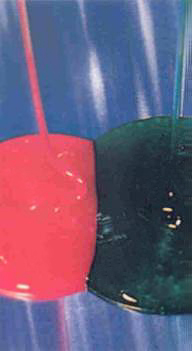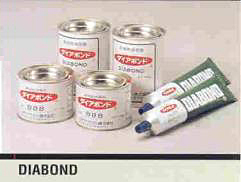|
|
 |
TOAGOSEI-ARON ALPHA
QUICK-SET HIGH-STRENGTH ADHESIVES
There is an Aron Alhpa adhesive suitable for instantaneous and permanent bonds
to almost all materials, Aron Alpha adhesives are composed of alpha
cyano-acrylate monomers (liquid state). When this adhesive is spread thinly on
the surfaces to be bonded, the small quantity of moisture on the surface acts as
a hardening agent, rapidly turning the monomer into a solid polymer and bonding
the materials

|
| |
| |
| |
| |
 |
Hardloc
Hardloc Adhesive is a two component Acrylic Adhesive.
It is a new modified series of acrylic type high – performance adhesive
originally developed by DENKA'S unique technology. Excellent in impact
resistance, curable at an ambient temperature, and of a two – component, non
– mixing type, the adhesive can contribute to remarkable improving working
efficiency. The adhesives are most suitable for bonding metals, ceramics,
plastics, lens and other materials.
Hardloc adhesive is manufactured by Denki Kagaku Kogyo
Kabushiki Kaisha.
| |
| |
Hardloc Characteristics
| Classification |
Characteristics |
| Modified acrylic
|
- Quickly cures at room temperature, therefore simplifying procedures,
- Superb resistance to shearing, impact and peeling.
|
| Ultraviolet / Heat curing |
- Quickly cures with either exposure to ultraviolet light or when used
together with the heat curing process,
- May be applied with either pin transferring, screen printing or with the
dispenser.
|
| Two-liquid type urethane
|
- Quickly cures in room temperature and no solvents are used. Excellent
initial bond strength and workability.
- The adhesive layer possesses excellent flexibility, and superb resistance
to shearing, impact and peeling.
|
|
| |
| |
| |
| |
 |
Diabond
Diabond adhesives have been developed in various types according to rapid
progress of Japanese industries, and are widely used in many industrial fields
such as Automobiles, Electric and Electronics, Ship Buildings , Construction,
Shoes Making, Furniture and general Home-use.
Diabond has various adhesive for bonding different materials, including
metals to vulcanized rubbers and many kinds of plastic.
It also has unique series of adhesive for speaker assembly purpose. |
|
| |
| |
| |
| |
One-Component Epoxy Resin
of Epi Fine
DESCRIPTION
Epi Fine series consist of one-component epoxy resin, which is, designed
for high reliability relay parts applications. This product also finds utility
in such micro electronic applications as sensors, switches, and ceramic filters.
In the market place there are several weakness of one-component epoxy
resin for relay parts. Some of the issues associated with these types are as
follows.
- It needs to be stored under refrigerated conditions.
- There is much out gassing and shrinkage while thermal curing.
- Poor adhesive force. Easy to remove from plastics such as PC, PBT, and
LCP.
- Difficult to control flow length.
- Uncured in small gaps due to separation of resin and hardener by
capillary action.
- Low C.T.I. (Comparative Tracking Index) value.
Kisco has developed a new product Epi Fine series, which overcomes the
above problems. Epi Fine series was especially formulated for the micro relay.
| FEATURES |
BENEFITS |
| Active post 30 days at 40 degree C |
Long lifetime |
| No organic gas generated during reaction |
Contamination is eliminated |
Excellent surface adhesion between plastics
and epoxy resin
|
Complete seal |
| Good heat and chemical resistance |
Device protection |
| Controlled epoxy flow characters |
Device protection |
| Over 560V for C.T.I value (IEC 112) |
Excellent reliability |
LOW CURING TEMPERATURE PROCESS CONDITIONS
Epi Fine series is set to gel within 5.5 minutes at 100 degree C. Total
time for hardening to occur is 30 minutes at 120 degree C.
Epi Fine series have some items which could cured at 80 oC, it is
especially suitable for low dimensional stability resin parts. |
| | | |
